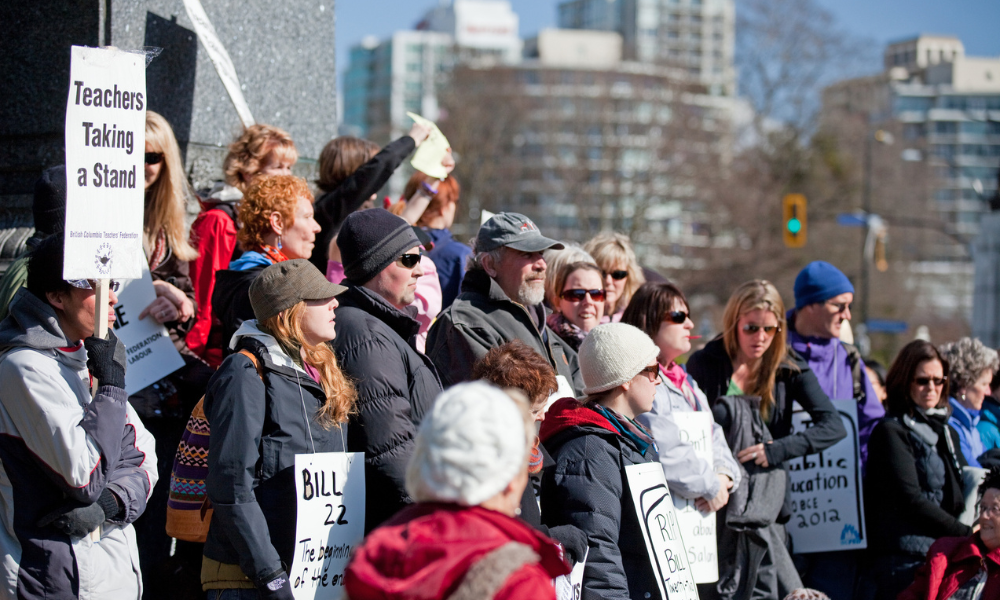Ontario's back-to-work legislation for education workers faces criticism for use of notwithstanding clause

The Canadian Union of Public Employees (CUPE) is threatening a walkout by its 55,000 members on Nov. 4 after the Ontario government introduced back-to-work legislation.
“On Friday, regardless of what this legislation says, our members will be engaging in a province-wide protest. That means no CUPE education workers will be at work. Instead, we will be taking a stand for public education for ourselves and for our future,” said CUPE Ontario President Fred Hahn, according to CP24.com.
“Our union and others have been effective in challenging governments in the courts and we won but all too late for workers. Enough is enough. We may in fact challenge this in court but we are first going to challenge it in our communities. We are not going to allow our rights to be legislated away.”
Read more: Ontario to introduce legislation to avoid education workers’ strike
The Ontario School Board Council of Unions also voiced its support:
“We will not allow our rights to be legislated away. They may have a majority in the legislature. We have a majority across the province. We will take a stand and do everything we can to defend workers' rights and to defend public education.”
Refusing to compromise?
Premier Doug Ford’s government introduced the Keeping Students in Class Act today to ensure students remain in the classroom.
“Students are finally back in class catching up, following two years of pandemic disruptions. We are disappointed that CUPE is refusing to compromise on their demand for a nearly 50-per-cent increase in compensation, representing a price tag close to $19 billion if extended across the sector,” says Stephen Lecce, Minister of Education.
“CUPE has now made the decision to strike, putting their own self-interest ahead of Ontario’s nearly two million children, who deserve to stay in class learning. We are delivering on our promise to parents that our government will do whatever it takes to keep students in class, so they can catch up and get back to the basics of learning.”
Read more: Ontario could save $10 billion with Bill 124
The Keeping Students in Class Act would, if passed, establish a four-year collective agreement for Ontario’s 55,000 education workers that ensures stability for students and includes:
- a salary increase of 2.5 per cent for employees with the top end of their salary/wage grids below $43,000 annually (increased from $40,000) and 1.5 per cent for employees with the top end of their salary/wage grids above that amount for each year of the contract
- an increase in benefits contributions resulting in a $6,120 annual employer contribution per employee by Aug. 31, 2026
- funding through the Support for Students Fund, estimated to support up to 875 teachers and between 1,600 and 1,830 education workers
- modification to sick leave and short-term disability leave plan provisions that protect stability of student learning, while maintaining generous pension, benefits and sick leave programs
- $4.5 million in funding for apprenticeship training
- an extension of modified job security provisions.
Ontario’s education workers are among the best paid compared to other provinces, says the government, and the average salary for a CUPE employee is $26.69 per hour.
Charter challenge?
To protect against legal challenges, which may create destabilizing uncertainty for students and families, this act would provide that it shall operate notwithstanding sections 2, 7 and 15 of the Canadian Charter of Rights and Freedoms and despite the Human Rights Code, says the government.
But that move is questionable, tweeted David Doorey, associate professor of work law at York University in Toronto.
“There you have it folks, Ontario Conservatives are the first Canadian government to use the notwithstanding clause to override constitutionally protected labour rights. Quite a day in Canadian labour law and constitutional history.”
The new legislation is not back to work legislation if workers never left work, he tweeted: “It’s a prohibition on the Charter-protected right to strike and an imposed contract. Big difference.”




